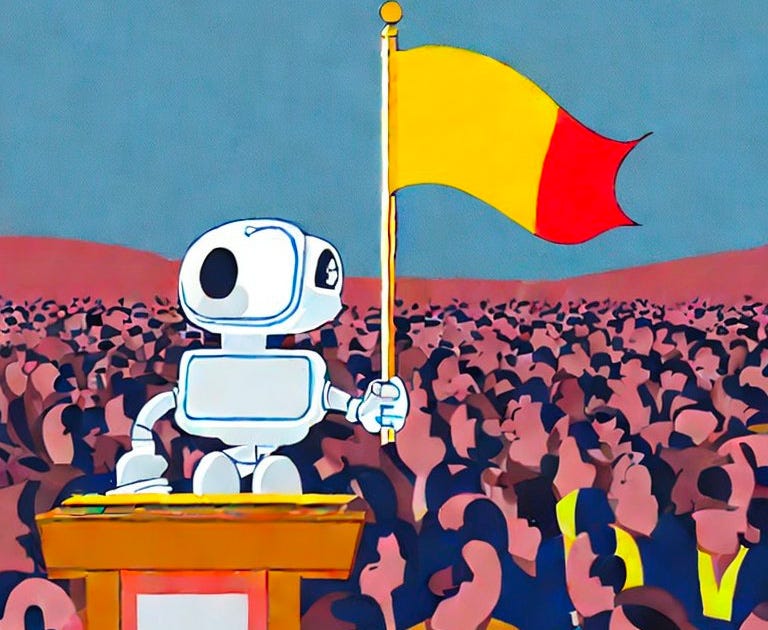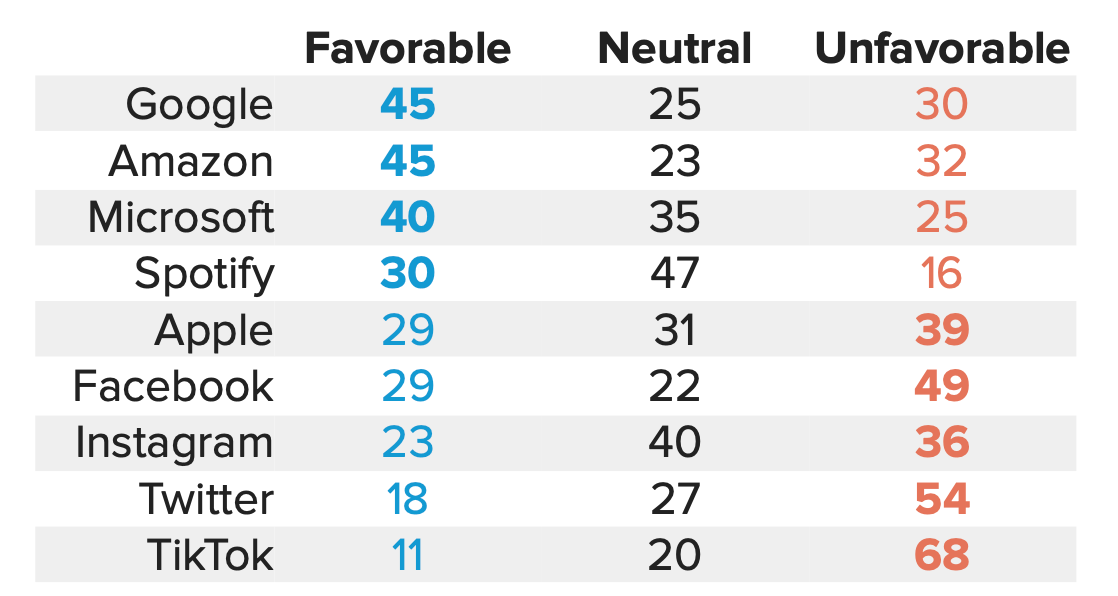New poll reveals a serious gap in public perception among big tech and AI
Americans say change is coming, it's not clear how, and it feels not great.
Almost one in three Americans expects to be using AI in the next couple years, and the feelings caused are not warm and fuzzy. Americans who’ve used AI think more favorably of it, but only 5% think they have. Only 45% of Americans have a favorable opinion of Google, and it only gets worse with the other big tech brands.
Bipartisan anything is pretty rare these days, but there’s bipartisan agreement that tech needs better regulation and AI is politicized. Significantly more Republicans believe tech is making life worse. AI and tech is ripe to be politically weaponized heading into the 2024 cycle with the GOP having a 50/50 shot of taking back the Presidency, a favorable US Senate map, and momentum in keeping the US House.
Change Research, an innovative polling firm, just delivered this data through a survey of 1,236 Americans that reveals how far behind big tech and AI has fallen in the public perception. Check the full analysis out for more, but some highlights below.
TikTok has the least favorable impression among the public, then Twitter and Meta
Google and Amazon lead the pack, reflecting reflects their relative status as institutions of American life and carrying fewer political wounds than Meta, TikTok, and post-Musk Twitter. One surprise is Apple, which has greater unfavorables than favorable ratings, despite generally quiet political positioning.
1 in 4 Americans are expecting AI to change their daily lives soon, but are uncertain how.
25% of Americans expect to use AI daily in the next two years, with expected positive impacts on computer programmers, doctors, graphic designers, and more. (I think I roughly agree if we are talking radiologists!)
When the survey switched gears to how AI will impact the respondent’s own job, half were unsure — much less certain than their hypothesized opinions about impacts on other careers.
While AI is already in many popular tech products, only 5% of Americans know they’re using it daily
In contrast to the 25% of Americans who are expecting to use AI daily in the near future, only 5% report they use it daily today and only 7% feel ‘very familiar’ with products like ChatGPT.
In the poll, Americans who know they’ve used AI have a more positive feeling towards it.
The packaging matters: assuming >90% of Americans have used search engines recently, or smartphones’ photos apps, all of which make heavy unbranded use of AI to make these products more effective.
There’s bipartisan agreement on the need for more effective tech regulation from the federal government
The Democratic and Republican media ecosystems are finding rare unity around big tech and AI, but Republicans feel worse about it. 57% of Dems and 84% of Reps give the federal government negative ratings on how effectively it is doing regulating the technology industry — this just doesn’t happen about most topics!
Republicans feel that tech has made life worse by a 25 percentage point margin and believe AI is politically biased towards liberals.
It’s easy to see how, this is an emblematic story of how ChatGPT is being covered in conservative media: “ChatGPT faces mounting accusations of being 'woke,' having liberal bias: Users accuse AI bot of anti-Trump bias, favoring transgender ideology” - Fox News, 2/16/23
There’s a vacuum of daily experience being filled by the echo chamber. AI users are more positive about its promise. People feel AI will have an effect, and change is scary. Republicans, in control of the House and with a 50/50 shot of taking the Presidency and/or the US Senate in 2024, are ready to weaponize big tech and AI for political gains without any regard for rational policy. One lane of opportunity might be an economic security argument — there is bipartisan agreement in the survey that developing AI is a national security necessity.
This survey came before the Silicon Valley Bank collapse and resulting government actions to save depositors, which did not help the tech narrative.
Having spent the last five years working at the intersection of politics and tech, casual political observers often miss that the incentive to get elected/re-elected is as powerful as profit is in the commercial world – and the tech industry is not giving the public a lot of reasons to love it at the moment. The tech world can’t rely on how wonderful its products are and have been; instead, it needs communicate more proactively as an industry to talk about positive impacts, economic enablement, lower friction in the economy, how AI can make existing workers reduce drudgery in their jobs, and reframing AI use cases less like HAL 9000 and more like spell check. When public opinion starts to change, politicians will follow, and win-wins can be created for the US economy and society.






